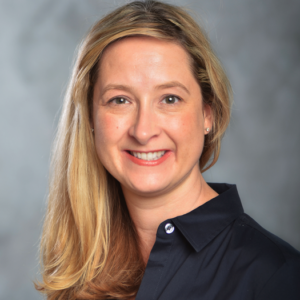Meet Nurse Birch

In 2011, the magnitude 9.0 Great East Japan Earthquake hit Tohoku, resulting in a devastating tsunami and nuclear disaster. Although she wasn’t present, Sarah Birch, DNP, APRN, CPNC-PC, used her experience as a nurse leader to assist from the United States. With funding support from the U.S Japan Council TOMODACHI Initiative and Johnson & John Family of Companies Tokyo, she began to develop the foundation for a disaster training program based at Children’s National. In 2015, Children’s National launched the TOMODACHI J&J Disaster Nurse Training Program.
“Hospitals and healthcare providers are a vital part of disaster preparedness, planning, and response at the local, state, and national level. However, disaster-related content is limited in most healthcare programs,” Birch said, explaining her motivation behind the program. “Nurses make up the largest workforce body in both urban and rural settings, and they are well positioned to participate in planning efforts, education, and patient care related to disasters.”
The program aims to capacity-build disaster nursing skills, from preparation to recovery. “We have adapted our program to meet the needs of our participants,” Birch explained. “As immediate response efforts were completed, the needs of the communities shifted from response to recovery and we modified our content to include a larger focus on mental health and include elements to help build resilience post-disaster,” Birch elaborated.
Incorporation of these elements has been as important for the healing of the trainees as they were for the communities in Tohoku. “For that first cohort, the disaster was palpable,” Birch described. “Some lost family members and were escaping rising waters themselves.” Storytelling was one of the most powerful approaches to help with healing, Birch shared.
Collaborative efforts in the U.S. were integral to actualizing this approach. Medical professionals from New York University Langone Hospital and New York University Rory Meyers College of Nursing provided accounts about how the Neonatal Intensive Care Unit and College of Nursing responded to Hurricane Sandy in 2012. From a personal perspective on disaster, Birch explained how integral support from 9/11 families was for empowering the nurses to share their stories. “One of the incredibly moving aspects of the program is we all experience disaster differently,” Birch expressed. “[Disasters] can be individual or large-scale, and healing, building awareness, and education are all valuable outcomes that can be achieved through sharing experiences.”
For Birch, the most rewarding part of her work is witnessing the resilience of the students. “Hearing them vocalize their stories and seeing that growth and empowerment over such a short time is really powerful for me as a hospital leader,” Birch voiced. In addition to the personal development the program achieves, Birch is equally proud of the professional growth of the participants. “They’re all students. They haven’t been nurses yet, on the floor with that kind of responsibility,” Birch said of her amazement at the take-charge attitudes of the students, despite their lack of professional exposure to emergency situations.
Once they become nurses, alumni of the program have continued to fulfill their roles as advocates in disaster situation, providing disaster response as well as community recovery work. Alumni have responded to severe mudslides and flooding in Southern Japan, organized mental health workshops, and volunteered at community centers. As the alumni from the first three years begin their work as nurses, the program is welcoming a fourth cohort this year.
Birch explained how this newest group is unique from the years previous, simply by virtue of their relationship to the disaster. “As you get to the fourth-year cohort you get a little bit farther out from the disaster, but their community is actively recovering, and they all want to participate helping their community.” There may be fewer traces of the disaster in the personal lives of newer cohorts, but they still wish to address the burden of those around them. A desire to respond and a capacity to care are essential for all nurses, whether seasoned or trainee.“As an organization, Children’s National is responsible for educating the next generation of pediatric providers and publicly advocating for pediatric health,” Birch said. Regardless of how many years have passed since the original disaster, the TOMODACHI J&J Disaster Nurse Training Program and Sarah Birch remain dedicated to fostering these elements in students who will help create a future of preparedness, recovery, and resilience.


